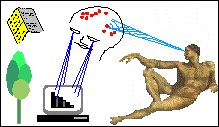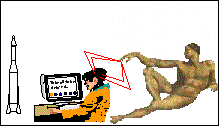Tor Norretranders: |
||
Title: The User Illusion |
||
The purchase
of the book can be strongly recommended to anyone who
The following quotations are to give an idea of the general contents of the book. |
||
| On consciousness lagging behind reality, page xi: The astonishing results indicate that consciousness lags behind what we call reality. It takes half a second to become conscious of something, though that is not how we perceive it. |
||
| Poem by Maxwell about subconsiousness, page 6: powers and thoughts within us, that we / know not, till they rise / Through the stream of conscious action from where the / Self in secret lies. |
||
| Newton and the incomprehensibility of God, page 24: Newton talked of God who sees, hears, and understands everything "in a manner not at all human, in a manner not at all corporeal, in a manner utterly unknown to us. As a blind man has no idea of color, so we have no idea of the manner by which the all-wise God perceives and understands all things." (Netwon is quoted by Norretranders within the quotation marks) |
 God is not accessible to logic alone. The
medieval mysticisms of Meister Eckhart (1260-1329) God is not accessible to logic alone. The
medieval mysticisms of Meister Eckhart (1260-1329) |
|
| On Gödel`s
ingeniousness, page 51: Gödel`s ingenious idea was to take the assertion "I cannot be proved." and, further down the same page: Gödel`s proof is also proof of impotence. Not, however, of the impotence of man - but of the impotence of logic. |
||
| On the energy
consumption of the brain, page
117: ...the brain already appropriates a large proportion of the body`s overall resources: a fifth of its entire energy consumption. |
||
| On bits
per second and the brain, page
125, 126: The eye send at least ten million bits to the brain every second. The skin sends a million bits a second, the ear one hundred thousand, our smell sensors a further one hundred thousand bits a second, our taste buds perhaps a thousand bits a second. All in all, over eleven million bits a second from the world to our sensory mechanisms. |
||
| On the bandwidth
of consciousness, page 126: A million times more bits enter our heads than consciousness perceives. |
||
| On consciousness
as a spotlight, page 126: ...consciousness is like a spothlight that emphasizes the face of one actor dramatically, while all the other persons, props, and sets on the vast stage are lost in the deepest darkness. The spotlight can move, certainly, but it takes a long time for all the faces in the chorus to be revealed, one after the other, in the darkness. |
||
| On the function of
symbols, page 132: In other words, symbols are smart. They help us remember masses of information, even though we can keep only seven things in our minds at once. Symbols are Trojan horses by which we sumggle bits into our consciousness. "Our memories are limited by the number of units or symbols we must master, and not by the amount of information that these symbols represent..." |
||
| On the channel
capacity of the brain, page
143: Measurements of the channel capacity of the brain are harder to undertake experimentally, but we can estimate the magnitude Karl Küpfmüller arrives at a figure of ten billion bits a second... |
||
| On what
consciousness is not, page 172,
173: "One thing is now clear," John Kihlstrom wrote in Science in 1987. "Consciousness is not to be identified with any particular perceptual-cognitive functions such as discriminative response to stimulation, perception, memory, or the higher mental processes involved in judgement or problem-solving. All of these functions can take place outside of phenomenal awareness. Rather, consciousness is an experimental quality that may accompany any of these functions." |
||
| On the
question of awareness, page
173: But if consciousness selects at random from what comes in, it really is not much use. There must necessariliy be a degree of "wisdom" in the sorting that takes place... |
||
| On the consctructionist
function of senses, page 186: In his widely used textbook on the psychology of sight, Eye and Brain (1966), Gregory wrote: "The senses do not give us a picture of the world directly; rather they provide evidence for the checking of hypotheses about what lies before us. |
||
| On the basic idea of Gestalt psychology, page 186: Gestalt psychologists such as Edgar Rubin insisted that we could not divide sensation into arbitrarily small units that could be studied independently. There is a wholeness about humans sensation, which cannot be done away with. |
||
| On the ratio of nerve and sensory cells, page 194: There are a hundred million nerve cells in the first visual area the impulses reach. That is quite a lot, because there are only a few million visual cells in the eye. |
||
| On the
spotlight function of awareness,
page 199: ...attention and consciousness are a searchlight tht picks something out on a stage where a great deal is going on at the same time. |
Synchronicity: The German physicist Wolfgang Pauli the psychologist C. G. Jung wrote together on the synchronicity of events. | |
| On the
synchronicity of nerve cells,
page 203: In 1989, a group of German scientists discovered that nerve cells in cats oscillate in synchrony when the cells see the same object. These oscillations take place forty times a second and apparently express agreement by the cells that they are seeing the same object. |
||
| On a pre-conscious "Bereitschaftspotential"
and free will, page 216: If the brain started sometime before I decided to move my finger, do I possess free will? |
||
| Metaphor of consciousness
surfing, page 223: Consciousness surfs the brain waves. |
||
| On the
power of consciousness, page
243, 244: Consciousness may occur after the brain has gone into action, but it also occurs before our hand does so. And, further down the page: Consciousness cannot initiate an action, but it can decide that it should not be carried out. And on page 244: We can control our actions but not our urges... |
||
| On what
determinists believe, page 260: The determinist says thtere is no free choice at all, for everything is preordained. The only reason we feel we have a choice is that we do not know the circumstances inside us or outside that determine what we will do... |
||
| Abraham Maslow on Taoistic state of mind, page 267: Maslow describes as Taoistic (after the Eastern philosophy) the state of awareness in which you do not desire to change that of which you are aware... |
||
| On Split-brain
patients, page 283: The lesson we learn from studies of split-brain patients is that the self or the I (as we call it in this book) lies like crazy to create a coherent picture of something it does not understand in the slightest. |
||
| Richard
Dawkins on when consciousness arises, page 292: As the British biologist Richard Dawkins puts it, "Perhaps consciousness arises when the brain`s simulation of the world becomes so complete that it must include a model of itself." |
||
| Aldous
Huxley`s drug experiences, page
293: What would happen if we could experience the world directly, without simulating it first, without requiring half a second to digest the experience, which is then presented as if it were contemporaneous with the material being experienced? |
 Aldous Huxley about the effect of mescalin on
conscious experience (1953) Aldous Huxley about the effect of mescalin on
conscious experience (1953) |
|
| On the
power of the unconscious, page
296: "Many scientists and creative thinkers have noted taht the mind`s best work is sometimes done without conscious direction, during receptive states of reverie, idle meditation, dreaming, or transition between sleep and wakefulness." |
||
| Laotse
(Lao-tzu) on talking, page 309: "Those who know do not talk. Those who talk do not know." |
||
| Richard
Feynman on consciousness, page
326: In 1955, the American physicist Richard Feynman put it thus: "The atoms that are in the brain are being replaced; the ones that were there before have gone away. So what is this mind of ours: what are these atoms whith consciousness? Last week's potatoes! They now can remember what was going on in my mind a year ago." |
||
| Gödel
on cognitive reductionism, page
366: Gödel`s proof offers the notion that a high-level view of a system may contain explanatory power which simply is absent on the lower levels. |
||

